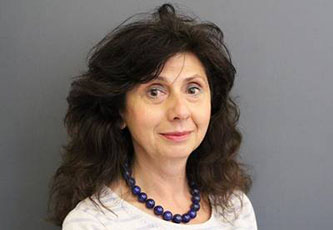Author and Historian Joanna Beata Michlic to Brooklyn College Students: “The Study of Holocaust Survivors Can Constitute a Template for Comparative Studies of Other Victims of Genocide.”
Nov. 1, 2018

Joanna Beata Michlic
Joanna Beata Michlic, a distinguished scholar of Polish-Jewish history, visited Brooklyn College last week to share some of her notable research on child survivors of the Holocaust in Poland during the early postwar period in a lecture titled “Child Holocaust Survivors: Jewish Families After the Holocaust,” which was sponsored by the Department of Judaic Studies and the Ethlye R. Wolfe Institute for the Humanities. Michlic is the founder of the Hadassah-Brandeis Institute Project on Families, Children, and the Holocaust at Brandeis University, and also teaches at Leo Baeck College in London.
Michlic’s research has shattered misconceptions about many socio-cultural topics of the period, while also extrapolating lessons that can be applied today.
“The study of the many issues around Jewish children who survived the Holocaust and its effect on them, as some rejoined relatives, and the ongoing affect on Jewish family life, has implications for children in Syria, Iraq, and parts of Africa and Latin America,” she said. “The study of Holocaust survivors can constitute a template for comparative studies of other victims of genocide in the 20th and 21st century.”
Michlic has probed deeply into some of the personal narratives of child Holocaust survivors, digging through correspondence, as well as published work. Her interest is in their memories, their stories of rescue and resilience, and the very nuanced process of trying to reclaim their childhoods and some sense of identity.
She read passages from stories about a Jewish professor who had been reluctant to even speak about the war until nearly 50 years after the fact and another excerpt about a retired medical doctor who had been smuggled away for her safety by a Polish engineer a day after she was born, and only learned about her true identity and family much later in life.
“The Holocaust forced young Jews to suppress their identity in order to survive,” she said. “In the immediate post-war years, the children were confronted with the news of being Jewish and had to shed their acquired wartime Christian-Polish identities. The return to Jewish identity became a very painful and gradual process marked by confusion and fear.”
The departments of History, Political Science, Sociology, and the Women and Gender Studies program also sponsored the lecture.






